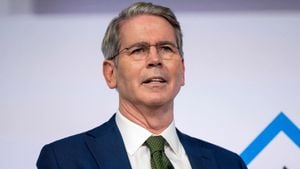Donald Trump’s recent campaign remarks concerning the Jewish vote have ignited alarm among Jewish leaders, who fear these statements could incite violence against their communities. During two separate speeches on Thursday, Trump claimed, “the Jewish people would have a lot to do with” his defeat if Kamala Harris won the election. This rhetoric, delivered at events targeting Jewish audiences, understandably caused outrage, especially amid rising antisemitism across the political spectrum.
Trump placed the blame for his lower-than-expected support from Jewish voters squarely on the community itself, stating, “With all I have done for Israel, I received only 24 percent of the Jewish vote” during the 2020 election. His comments suggested impending electoral repercussions hinged on the Jewish electorate’s preferences, framing them as responsible for his potential election loss.
Trump’s remarks occur against the backdrop of an alarming rise in political violence and antisemitic sentiments. According to Jonathan Greenblatt, CEO of the Anti-Defamation League, Trump’s blame game exacerbates the vulnerability felt by Jewish Americans, particularly when right-wing extremists and others on the left have been known to demonize Jewish communities. He emphasized the danger of such rhetoric, positing it could incite hostility, saying, “This speech likely will spark more hostility and inflame an already bad situation.”
Jewish Americans represent approximately 2.4 percent of the U.S. population, with significant populations concentrated in New York, Florida, and California. While these areas aren't typically battleground states, every vote counts, particularly during tightly contested elections. Expert opinions suggest Trump’s remarks are not only irresponsible but could undermine the safety and sense of belonging within Jewish communities during these troubled times.
On the other hand, Trump’s election strategy has taken on new, racially charged dimensions. Critics have leveled accusations of sowing division among racial and ethnic groups for political gain, particularly targeting Kamala Harris and her identity. During the first presidential debate of the season, Trump made jarring remarks insinuated hers as opportunism, questioning her authenticity as he remarked she recently “turned Black.” This tactic taps deep racial anxieties, as experts suggest it fits within his larger strategy of driving wedges among different demographic groups.
Political analysts believe Trump’s comments reflect age-old tactics used to divide voters by racial and ethnic lines, reviving tropes unpopular even among his core supporters. Trump has been known to engage with conspiratorial themes, sometimes blaming marginalized groups for societal issues, claiming they were stealing jobs or resources from American citizens. Recent remarks about immigrants allegedly consuming pets (which have been debunked and fact-checked) exemplify these harmful narratives.
Such divisive rhetoric isn’t purely historical; it has found new traction as the GOP reaches out to immigrant communities and poor urban neighborhoods. Experts observe current strategies aim at disillusioned voters who may feel neglected by Democrats, reinforcing historical tensions stemming from race, class, and national identity.
Statistical analysis of upcoming elections indicates the significance of minority demographics. Polling suggests Trump doesn’t need to win the Black vote outright; rather, he must chip away at Biden’s margins. Bakari Sellers, a prominent Democratic strategist, points toward Harris securing over 80 percent of Black votes currently but emphasizes she will need to reach closer to 90 percent to likely win.
Further complicity arises when discussing immigrant issues among Black voters, who may feel economically sidelined by resources being allocated to non-citizen populations. Many feel the Democratic Party has neglected their needs for too long, fostering the potential for Trump to gain ground by leveraging such frustrations.
Past policies like undocumented immigrants gaining access to state-backed loans have sparked outrage. A recent proposal (ultimately vetoed by California Governor Gavin Newsom) aimed to provide substantial financial aid to certain undocumented communities. Such headlines resonate with working-class Black citizens grappling with their own economic hardships, spurring heightened resentment.
Trump campaign insiders note this trend, insisting they recognize growing grievances among Black voters. They argue these sentiments signal disengagement from Biden’s administration and allude to the GOP’s potential for greater influence among urban communities.
This political strategy, focused on generating polarization among different voter bases, has roots linking back to historic stereotypes and divisive rhetoric. Jason Williams, professor of Justice Studies, links Trump’s comments about immigrant behavior to age-old prejudiced narratives, reiterative of the ‘divide and conquer’ mentalities re-emerging within modern politics.
The overall sentiment among various factions—Jewish leaders, critics of Trump's racial comments, and strategists—points to one alarming conclusion: The political environment leading up to the election is becoming increasingly incendiary, leaving many communities on edge. Connective patterns of blame directed at minority groups not only undermine social cohesion but threaten peaceful coexistence within the broader political arena.
With such incendiary language fueling concerns, the nation is bracing itself for what could be one of the most contentious election cycles yet. Whether this rhetoric will resonate favorably among potential voters or backfire, risking personal safety and social stability for those involved, remains to be seen. Amidst the noise, one question persists: How will these charged political dialogues shape not just the elections but the fabric of society itself?



